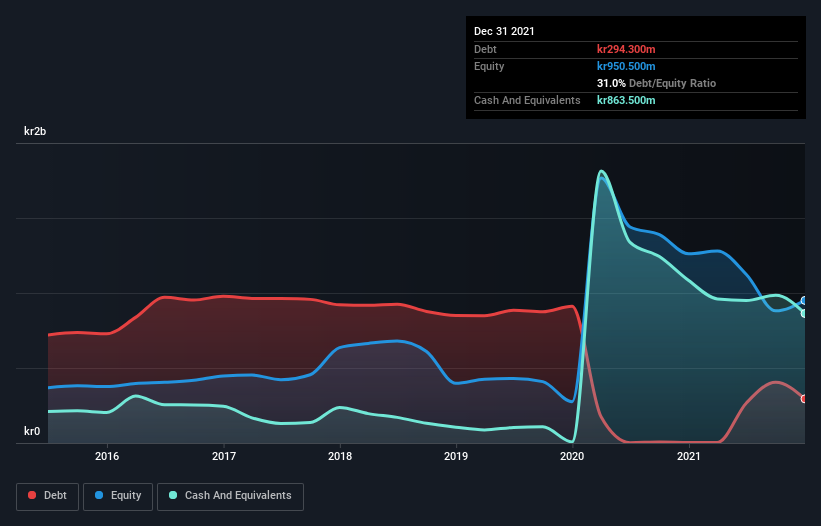
Some say volatility, rather than debt, is the best way to think about risk as an investor, but Warren Buffett famously said that 'Volatility is far from synonymous with risk.' When we think about how risky a company is, we always like to look at its use of debt, since debt overload can lead to ruin. We can see that Concejo AB (publ) (STO:CNCJO B) does use debt in its business. But the more important question is: how much risk is that debt creating?
When Is Debt Dangerous?
Debt assists a business until the business has trouble paying it off, either with new capital or with free cash flow. Part and parcel of capitalism is the process of 'creative destruction' where failed businesses are mercilessly liquidated by their bankers. However, a more common (but still painful) scenario is that it has to raise new equity capital at a low price, thus permanently diluting shareholders. Of course, plenty of companies use debt to fund growth, without any negative consequences. When we think about a company's use of debt, we first look at cash and debt together.
View our latest analysis for Concejo
How Much Debt Does Concejo Carry?
You can click the graphic below for the historical numbers, but it shows that as of December 2021 Concejo had kr294.3m of debt, an increase on kr3.70m, over one year. But it also has kr863.5m in cash to offset that, meaning it has kr569.2m net cash.

How Healthy Is Concejo's Balance Sheet?
We can see from the most recent balance sheet that Concejo had liabilities of kr356.6m falling due within a year, and liabilities of kr183.1m due beyond that. Offsetting these obligations, it had cash of kr863.5m as well as receivables valued at kr95.6m due within 12 months. So it actually has kr419.4m more liquid assets than total liabilities.
This excess liquidity is a great indication that Concejo's balance sheet is almost as strong as Fort Knox. Having regard to this fact, we think its balance sheet is as strong as an ox. Simply put, the fact that Concejo has more cash than debt is arguably a good indication that it can manage its debt safely. The balance sheet is clearly the area to focus on when you are analysing debt. But ultimately the future profitability of the business will decide if Concejo can strengthen its balance sheet over time. So if you're focused on the future you can check out this free report showing analyst profit forecasts.
In the last year Concejo wasn't profitable at an EBIT level, but managed to grow its revenue by 2.2%, to kr261m. That rate of growth is a bit slow for our taste, but it takes all types to make a world.
So How Risky Is Concejo?
By their very nature companies that are losing money are more risky than those with a long history of profitability. And we do note that Concejo had an earnings before interest and tax (EBIT) loss, over the last year. Indeed, in that time it burnt through kr50m of cash and made a loss of kr22m. With only kr569.2m on the balance sheet, it would appear that its going to need to raise capital again soon. Overall, its balance sheet doesn't seem overly risky, at the moment, but we're always cautious until we see the positive free cash flow. The balance sheet is clearly the area to focus on when you are analysing debt. But ultimately, every company can contain risks that exist outside of the balance sheet. These risks can be hard to spot. Every company has them, and we've spotted 2 warning signs for Concejo you should know about.
When all is said and done, sometimes its easier to focus on companies that don't even need debt. Readers can access a list of growth stocks with zero net debt 100% free, right now.
New: AI Stock Screener & Alerts
Our new AI Stock Screener scans the market every day to uncover opportunities.
• Dividend Powerhouses (3%+ Yield)
• Undervalued Small Caps with Insider Buying
• High growth Tech and AI Companies
Or build your own from over 50 metrics.
Have feedback on this article? Concerned about the content? Get in touch with us directly. Alternatively, email editorial-team (at) simplywallst.com.
This article by Simply Wall St is general in nature. We provide commentary based on historical data and analyst forecasts only using an unbiased methodology and our articles are not intended to be financial advice. It does not constitute a recommendation to buy or sell any stock, and does not take account of your objectives, or your financial situation. We aim to bring you long-term focused analysis driven by fundamental data. Note that our analysis may not factor in the latest price-sensitive company announcements or qualitative material. Simply Wall St has no position in any stocks mentioned.
About OM:CNCJO B
Concejo
Designs, manufactures, and supplies fire safety products and systems.
Flawless balance sheet and slightly overvalued.
Market Insights
Community Narratives



